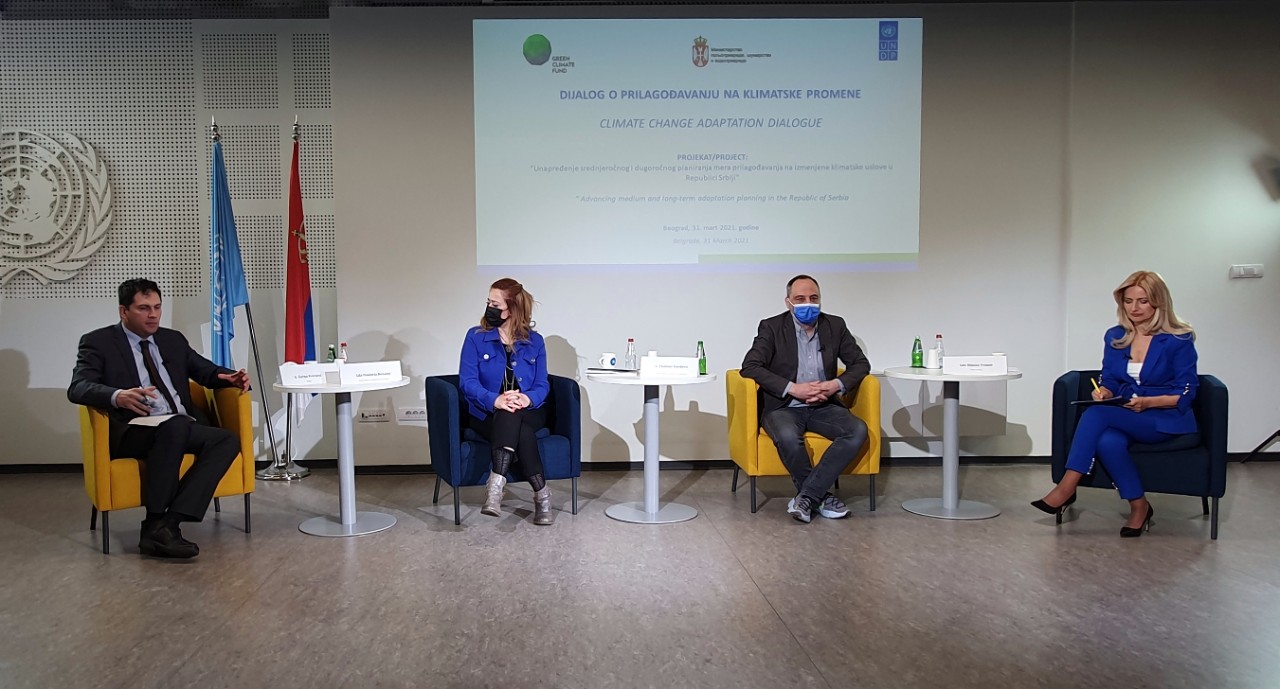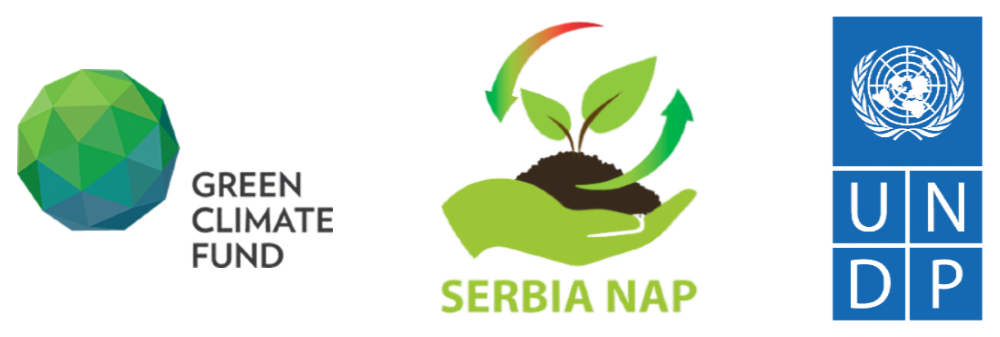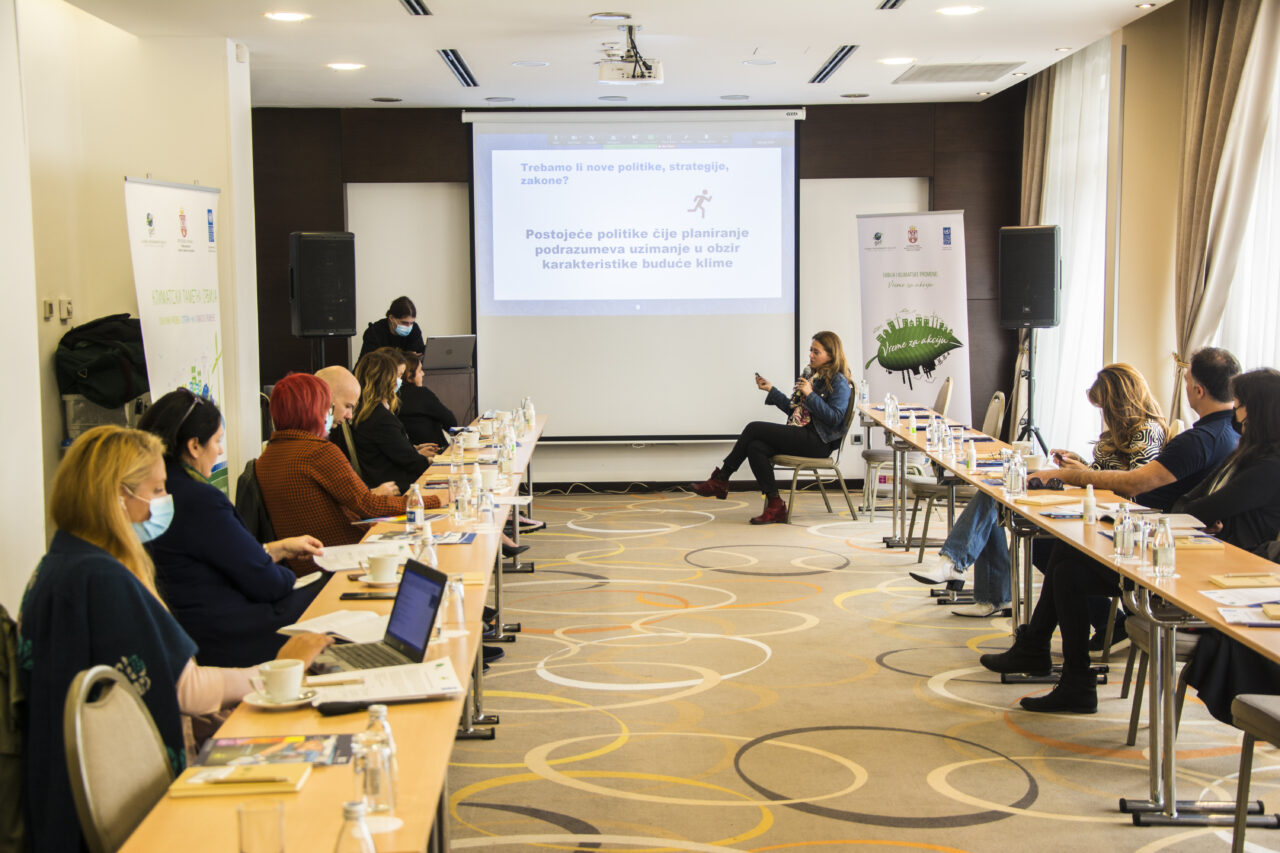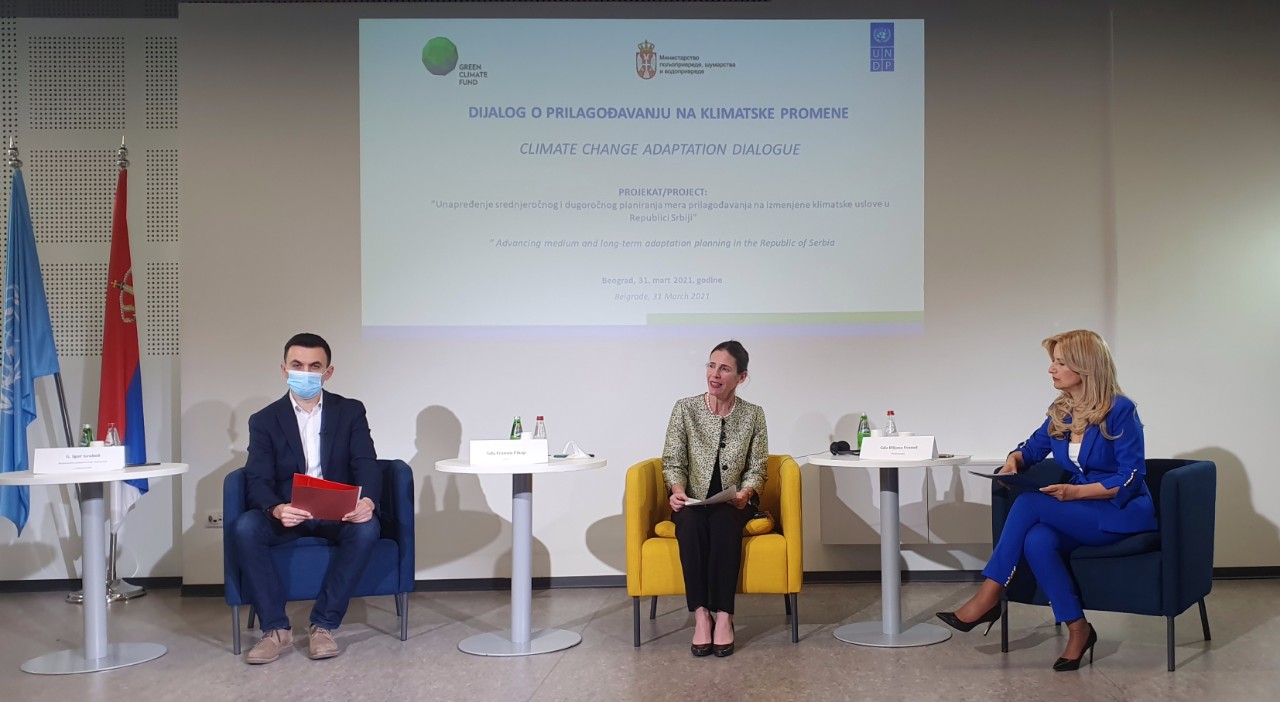-
Oct 05 2021 The first workshop for journalists on the topic of climate change in Serbia
The first of the planned five in a series of press workshops was held in Belgrade, October 1, 2021., on the topic of climate change in Serbia, where the participants were editors of numerous national media houses.
A press workshop on climate change was organized ahead of the 26th session of the members of the UN Framework Convention on Climate Change, which will be held from October 31 to November 12, 2021 in Glasgow, Great Britain, under the sponsorship of the UN. The leaders of 197 countries, including Serbia, will meet to present their plans and concrete activities aimed at preventing further global warming. COP26 is believed to be the last chance for the world to bring climate change under control.
The workshop is intended for editors and journalists who report on climate change, the economy, ecology, energy, agriculture, the public sector and related fields. The aim of the workshop is to engage media representatives in raising awareness of the general public on topics related to climate change, as well as networking between media representatives and experts in the field of climate change, for the purpose of future cooperation.
The importance of the conference in Glasgow, adaptation to climate change in practice and an overview of specific measures for sectors most vulnerable to climate change, on behalf of the UNDP spoke at the workshop: Miroslav Tadic, program analyst for environment and climate change, Snezana Ostojic Paunovic, project coordinator and Zorica Korać, portfolio manager. Danijela Božanić, an expert in the field of climate change, also spoke at the workshop on the topic of adaptation to changed climate conditions in Serbia.
This workshop and the future ones aim, among other things, to draw attention and raise public awareness, as well as to encourage dialogue with decision-makers at the local, national and regional levels, on climate change. The next workshops will involve even more media professionals and thus contribute to better informing the public about this important topic.
Attached are presentations from the workshop:
Miroslav Tadic and Snezana Ostojic Paunovic: https://adaptacije.klimatskepromene.rs/wp-admin/post.php?post=32038&action=edit
Danijela Božanić: https://adaptacije.klimatskepromene.rs/wp-content/uploads/2021/10/CC-Danijela-Bozanic.pptx
Zorica Korać: https://adaptacije.klimatskepromene.rs/wp-content/uploads/2021/10/NAP-potencijalne-mere-Zorica-Korac.pptx
-
Mar 31 2021 The first Dialogue on Serbia’s Climate Change Adaptation held in Belgrade
Belgrade, March 31st 2021 – Today, the United Nations Development Program (UNDP) organized a dialogue about the possible social and economic consequences of climate change in Serbia, the adaptation preparedness of our country, the price of climate resilience, and how to mobilize the funds to meet this price. This dialogue is part of the process of the National Climate Change Adaptation Plan, which UNDP is developing in partnership with the Ministry of Agriculture, Forestry and Water Management, with the support of the Green Climate Fund (GFC).
The dialogue participants underlined that climate change had a negative impact on food and energy production, biodiversity, availability of drinking water, and infrastructure, at the same time imposing more burden on the healthcare and social welfare service systems.
Serbia is in a region that is very vulnerable to climate change, with the average temperature growth higher than the global average. Combined with the rainfall regime change, the further temperature growth may double the number and intensity of heat waves, which would additionally raise the risk of floods, draughts and forest fires.
The findings of UNDP’s report indicate that climate change may slow down the economic development of Serbia, especially in the sectors of agriculture, water management, forestry, energy, transport and infrastructure. Extreme weather events, such as the 2014 floods, have caused more than 6 billion USD of damage since 2000, and if Serbia doesn’t promptly implement the adequate measures, by the end of the decade, it may lose the same amount of money.
The experts participating in the dialogue emphasized that climate change adaptation should become a part of every long-term development strategy. One of the key steps that Serbia has implemented so far was to adopt the Law on Climate Change, which turned the adequate response to climate change into a legally binding obligation.
In Serbia, extreme weather events have a growing impact on the availability of water for hydro power plant energy production, and they’re also causing a surge in energy needs during the summer, due to intensified use of air-conditioning for cooling. Furthermore, irrigation planning, which is necessary to keep the agricultural crop yields unchanged, also largely depends on the availability of water.
“One of the priorities of the Ministry, as a necessary adaptation measure, is to establish an irrigation system on as much arable land as possible. At the same time, our efforts are focused on building an efficient and effective system that will reduce the pressure of agriculture on our water resources. Adaptation measures—such as introducing climate adaptive cattle breeds and crops, adjusting the schedule of agricultural works to the changed crop calendar, crop rotation—are some of the measures that do not require additional investments, but they can greatly contribute both to reducing the negative environmental impacts and to producing healthier, higher quality food,” said Igor Grabež, representative of the national team for cooperation with GCF, on behalf of the Ministry of Agriculture, Forestry and Water Management.
 [/vc_column][/vc_row]
[/vc_column][/vc_row]Francine Pickup, Resident Representative of UNDP in Serbia, said that, thanks to the support from the Green Climate Fund, UNDP and the Government of Serbia were working together on the first National Adaptation Plan, so that Serbia could timely implement the necessary measures for climate change adaptation. “We provide support to institutions at the national and local levels to include climate change aspects into their strategic planning, legislation and investment planning. Within the NAP, we’re already preparing some specific adaptation measures for the most vulnerable sectors, as well as a sustainable strategy for their funding. Building climate resilience will bring Serbia closer to achieving the Sustainable Development Goals, especially Goal 13 which is about urgent climate action,” said Pickup.
According to UNDP reports, Serbia lacks the funds to implement the climate change adaptation measures at the national and local levels.
The dialogue participants believe that the state should involve the private sector in the transition toward a low-carbon, circular economy, in order to cover the costs of building climate resilience. An additional motivation for making such a move is the EU Economic and Investment Plan for the Western Balkans, which foresees 9 billion EUR of grant to the countries of this region, for the green transformation of economy and the public sector.
“The Green Climate Fund supports the Western Balkans countries in planning an optimal response to climate change, by improving the coordination between the competent institutions, collecting data on climate change impact, involving the private sector, and increasing investments into the adaptation measures. The regional cooperation offers an opportunity to these countries to jointly tackle the issue of climate change adaptation. While many sectors have already begun with the process of data collection, it is necessary to improve the availability of data on climate change risks and impacts, as well as on the most vulnerable sectors. This data is of crucial importance, not only for an efficient planning of adaptation, but also as the basis to crate and develop the financial support measures,” said Svetlana Frenova, GFC Advisor for East Europe and Central Asia.
The dialogue included the representatives of the Government of the Republic of Montenegro and the Government of the Republic of North Macedonia, as well as the representatives of the UNDP offices in Bosnia and Herzegovina and Moldova, who have contributed to the exchange of experience and strengthening of cooperation in the area of climate change resilience between the countries in this region.
The dialogue was part of the project Advancing medium and long-term adaptation planning in the Republic of Serbia – NAP, funded by the Green Climate Fund (GCF) and implemented by the UNDP, in partnership with the Ministry of Agriculture, Forestry and Water Management.
-
Jul 03 2020 Webinar: “National adaptation plan (NAP) systematic and risk-shaped response to climate change”
The webinar, held on Friday, July 3th, 10:00 – 12:30, was designed to provide decision-makers and other target groups relevant to the NAP creation process with answers to the following questions:
Why NAP?
Process or policy document?
Formulation – support and experiences?
Integrating adaptation into planning and development plans?
National and local actors – roles and benefits;The goal of the webinar was to contribute to an easier understanding of the purpose, strategic and multisectoral nature of the NAP and the data and information that need to be provided for the functioning of the complete NAP cycle: planning – implementation – monitoring – improvement.
The relevant international framework has been presented at the webinar, primarily the Green Climate Fund, UN Framework Convention on Climate Change (UNFCCC) and the Paris Agreement, as well as the EU’s experiences.
This webinar has been the first in a series of planned ones, with the following goals:• Involvement of all stakeholders; and
• Focused and continuous discussion and exchange of information, as well as acceptance of the roles of all stakeholders in the NAP process.The structure and support for the formulation of NAP as well as the main experiences, roles and benefits of various actors in this process were presented at the webinar. It was stated that the main goal of the NAP GCF project “Advancing medium and long-term adaptation planning in the Republic of Serbia” is to establish a system and capacity for the integration of adaptation measures into national and sectoral development goals, decision making and investment planning and financing. It was pointed out that the development of the NAP is important in order of reducing the climate change risks and losses.
It was emphasized that, according to the official data of the Republic Hydrometeorological Institute, 2019 was the year of climate records in Serbia and projections of future temperature trends regarding the implementation of adaptation measures were presented, as well as the latest global analysis of the results of investments in climate change adaptation.
The participants were presented with the vision of the NAP for the Republic of Serbia. Sets of activities and their sequence during the NAP document development process as well as the sectors most affected by climate change: agriculture, forestry, water management, energy, transport and infrastructure have been identified.
It was noted that disaster risk reduction should be an integral part of planning in each of the affected areas and that the focus is on strengthening the capacity of all relevant actors.
The webinar was presented to a wider group of stakeholders – more than 30 attendees from relevant national, provincial and local institutions, public companies, academy and international organization.
At the end of the webinar questions and answers were discussed by all participants.
Below are some of the questions and answers that have been discussed:- What are the further plans in the field of regionalization of agriculture in terms of adaptation measures?
It was pointed out that the regionalization of viticulture has been completed and that the regionalization of fruit and livestock is underway, but that the future climate projections need to be entered within them, while the regionalization of farming is planned to begin. It was emphasized that the situation at the local level in this sphere is diverse and that there are examples of good practice, but that further work should be conducted in this segment. - Is there a standardization plan and data reliability control system at the national level?
It was indicated that in defining specific sectoral measures and activities, efforts will be made to base them on reliable sectoral data, but also to create quantitative and qualitative indicators for monitoring progress. The main goal is to merge all existing sectoral data into one central system in order to facilitate the availability of such data. The need for further work on the quality of data was emphasized. - Is it planned to cover the area of soil erosion within the project objectives?
The coverage of the area of soil erosion through a joint view of the agriculture and water management sectors has been identified. Insufficient accuracy of data in the field of soil erosion is noted.
- What are the further plans in the field of regionalization of agriculture in terms of adaptation measures?
-
Kick-off meeting of the project “Advancing medium and long-term adaptation planning in the Republic of Serbia” was held together with the first Working Group meeting
Project “Advancing medium and long-term adaptation planning in the Republic of Serbia” aims is to strengthen national capacities to reduce the vulnerability and risk posed by climate change through the establishment of effective cooperation and coordination of all relevant institutions, as well as to identify measures for efficient adaptation to the changed climate conditions. The focus of the project is on the sectors of agriculture, forestry, water management, energy, transport and infrastructure. It is necessary to establish a system of information flow, to import all existing data within all sectors, and to make all data transparent and accessible. The main objective of the project is to provide a sustainable climate-resilient society and economy. The project is funded by the Green Climate Fund and implemented by the United Nations Development Program in cooperation with the Ministry of Agriculture, Forestry and Water Management.
In order to allow for the comprehensive and accurate collection of data and information required for the implementation of the project, a Working Group has been established. The Working Group has a total of 23 representatives from 15 institutions. Delegated members of the Working Group are representatives of the following institutions: Ministry of Agriculture, Forestry and Water Management, Serbian Chamber of Commerce, Statistical Office od the Republic of Serbia, FAO (Food and Agriculture Organization), Ministry of Construction, Transport and Infrastructure, Ministry of Environmental Protection, Republic Hydrometeorological Institute, Public Investment Management Office, Republic Geodetic Authority, Ministry of the Interior – Emergency Sector, Provincial Secretariat for Urban Planning and Environmental Protection, Ministry of Mining and Energy, Ministry of Health, Ministry of Finance, Ministry of Education, Science and Technological Development.
The kick-off meeting of the project “Advancing medium and long-term adaptation planning in the Republic of Serbia” was held on March 11, 2020 at the Metropol Hotel.
More information available here:
-
Inception workshop for the project „Advancing medium and long-term adaptation planning in the Republic of Serbia“ was held together with presentation on funding sources on fight against climate change
On Friday, December 27th, 2019 the UNDP in Serbia organized a meeting with representatives of the relevant national institutions which are providing their support when it comes to adaptation to changed climate conditions in Serbia through this project which will last for the next three years and will be funded by the Green Climate Fund.
The main goals of this project are to help the Government of the Republic of Serbia to:
- Develop and strengthen capacities to adapt to changed climate conditions (CCA);
- Conduct climate risk and vulnerability assessments;
- Develop effective methods, tools and informational systems for development of decisions on climate risks and sectorial adaptation measures.
The overall goal is to reduce the risk of climate change and to integrate the issues of adaptation to changed climate conditions into development planning and financing.
Beside this project inception meeting, a presentation on potential sources of financing the struggle against the climate change as well as the financing of the green projects and investments in overall was held. Discussion was focused around the existing and potential new mechanisms of financing the climate and green projects and all this in the context of accessing the global financing instruments such as the Green Climate Fund and “green credit lines” of the international finance institutions. Participants were given the opportunity to hear more about the new “Green deal” of the European Commission, a program document which puts the European development and fiscal policies in the center of the fight against the climate change, as well as about the circular economy and protection of the nature and the environment as a whole.
Professor Vladimir Djurdjevic from the Faculty of Physics of the University of Belgrade spoke about the main challenges when it comes to adaptation to climate change in Serbia with conclusion that the biggest losses will be caused by floods, droughts, high temperatures and wild fires. He said that in the period of 1890 and 1970 in overall 13 dry years were recorded while the same figure is observed for the period of 1970 to 2010, a fact which says that the number of dry years is doubled since the initiation of temperature measurements in Serbia.
Ms. Danijela Bozanic from the Climate Change Consulting presented the projected GDP losses and potential job losses in certain areas which are caused and could be affected by climate change. She spoke about the sectors in the economy that will be hit by the climate change the most. Among these are: health care, agriculture, energy sector but also the overall loss in workers productivity, availability of drinking water and crop yields. These are the factors which will have the biggest influence on the state budget, which will need to secure the adequate answers to changed climate conditions. When it comes to GDP, in case that no adaptation measures are implemented and average temperature raises to 2⁰C, the GDP could be reduced for 4.53% in the period 2020-2040 or even by 9.32% by 2100. The point was put on the overall social transformation towards the direction of climate/carbon neutrality and planning for the changed climate conditions, which means putting the focus on urgent investments in the area of preventive measures rather than on taking care of the consequences.




